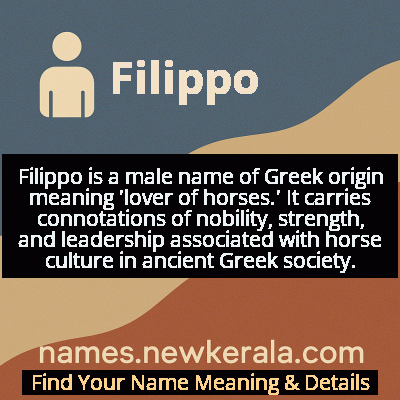Filippo Name Meaning & Details
Origin, Popularity, Numerology Analysis & Name Meaning of Filippo
Discover the origin, meaning, and cultural significance of the name FILIPPO. Delve into its historical roots and explore the lasting impact it has had on communities and traditions.
Name
Filippo
Gender
Male
Origin
Greek
Lucky Number
2
Meaning of the Name - Filippo
Filippo is a male name of Greek origin meaning 'lover of horses.' It carries connotations of nobility, strength, and leadership associated with horse culture in ancient Greek society.
Filippo - Complete Numerology Analysis
Your Numerology Number
Based on Pythagorean Numerology System
Ruling Planet
Moon
Positive Nature
Diplomatic, friendly, artistic, empathetic.
Negative Traits
Over-sensitive, moody, indecisive, prone to self-pity.
Lucky Colours
Green, cream, white.
Lucky Days
Monday.
Lucky Stones
Pearl, moonstone.
Harmony Numbers
1, 3, 4.
Best Suited Professions
Diplomats, mediators, caregivers, artists.
What People Like About You
Cooperative spirit, friendliness, artistic talent.
Famous People Named Filippo
Filippo Brunelleschi
Architect and Engineer
Designed the dome of Florence Cathedral, revolutionizing Renaissance architecture
Filippo Lippi
Painter
Important Florentine painter who influenced Botticelli and other Renaissance masters
Filippo Tommaso Marinetti
Poet and Writer
Founder of Futurism movement and author of the Futurist Manifesto
Filippo Inzaghi
Footballer and Manager
World Cup winning striker and one of Italy's most prolific goalscorers
Name Variations & International Equivalents
Click on blue names to explore their detailed meanings. Gray names with will be available soon.
Cultural & Historical Significance
In Italian culture specifically, Filippo became a name associated with artistic genius, architectural innovation, and intellectual achievement, reflecting the values of the Renaissance humanist movement. The name maintains its aristocratic and intellectual connotations in modern Italian society while also being accessible to all social classes. Throughout history, Filippo has been borne by saints, artists, and leaders, creating a rich cultural tapestry that spans religious, artistic, and political spheres.
Extended Personality Analysis
Individuals named Filippo are often characterized by their strong leadership qualities, intellectual curiosity, and creative spirit. They tend to be ambitious and determined, with a natural ability to inspire and motivate others. The historical association with horse lovers suggests qualities of nobility, strength, and grace under pressure. Filippos are typically strategic thinkers who approach challenges with careful planning and innovative solutions, much like the great architects and rulers who bore the name.
They often possess a blend of practical intelligence and artistic sensibility, making them well-rounded individuals who can excel in both technical and creative fields. Socially, Filippos are usually charismatic and confident, with a natural elegance that draws people to them. They value tradition but are not afraid to challenge conventions when necessary, embodying a balance between respect for the past and vision for the future. Their persistence and dedication to their goals often lead to significant achievements in their chosen fields, whether in arts, sciences, or leadership positions.
Modern Usage & Popularity
Filippo remains a popular and well-established name in Italy, consistently ranking among the top 100 male names. Its usage has remained relatively stable over the past century, demonstrating its timeless appeal in Italian culture. While particularly strong in central and northern Italy, the name is recognized and used throughout the country. Internationally, Filippo has gained some popularity among Italian diaspora communities, particularly in North and South America. The name maintains its sophisticated, classical image while remaining accessible and modern, with recent trends showing a slight increase in usage among educated, urban families who appreciate its historical significance and elegant sound.
Symbolic & Spiritual Meanings
Symbolically, Filippo represents nobility, strength, and intellectual mastery. The horse symbolism inherent in the name's meaning connects to themes of power, freedom, and graceful movement through life's challenges. Horses in symbolism often represent journey, progress, and the ability to carry burdens with dignity—qualities that resonate with the name's bearers. The name also carries connotations of leadership and strategic thinking, reflecting the legacy of historical figures like Philip of Macedon. In a broader sense, Filippo symbolizes the union of practical intelligence and creative vision, much like the Renaissance men who bore the name, representing someone who can navigate both traditional values and innovative thinking.

